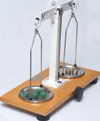

At the University of Florida’s Behavioral Neuroscience Lab, scientists are conducting experiments that examine the biological basis of behaviour. Using rats and mice, this particular laboratory focuses on studies that examine eating behaviour and its effect on obesity, nicotine addiction and ethanol intake.
The scientists are focusing on this study in recognition of the fact that two-thirds of all Americans are now considered to be obese, and that number is on the rise. Notably, growing numbers of obese mothers are pregnant and giving birth. By using the laboratory rats, the University of Florida is trying to determine the relationship between obese pregnant rats and their offspring and whether a high-calorie and high-fat diet poses additional risks for obesity in the pups (baby rats) depending on whether and when it is introduced into their diet.
The study is attempting to determine the metabolic and behavioural consequences of gestational over-nutrition (an obese mother) on rat pups. According to PhD candidate Anaya Mitra, “In this study, our focus is on the physiological effects of maternal obesity on developing rat foetuses.” She is particularly interested in results of this research from a public health, awareness and education standpoint.
In trying to replicate human eating patterns and behaviour, the experiments involve attempting to ‘create’ obese rats by engineering their diets to mimic a high-fat human diet. The ‘cafeteria-style’ diet fed to the lab rats consists of a 60% fat for example in Vienna sausages, oil-based cheese, peanut butter and cookie dough.
An essential tool in the laboratory is the Ohaus Explorer Pro precision weighing platform. “We use the Explorer Pro for just about everything, from weighing ingredients for the foods we prepare, to weighing food portions, both before consumption and after pre-determined time intervals, to measure the amount eaten by the laboratory rats, to weighing the rats. This is one scale that can do it all with incredible accuracy, to 0,01 grams. When we are looking for that type of accuracy and being able to handle a high load capacity in terms of the size of the rats, this is the scale we use. It is kept on a cart and wheeled to wherever it is needed,” says Mitra.
The rats in these experiments receive different quantities of a sugar-fat whip at various intervals to determine eating behaviour. For instance if it is available to them all the time, will they eat it all at once or in small doses? If it is only offered once in a while, will they have a feeding frenzy when it is presented? What percentage of the rats’ total caloric content is sugar-fat whip?
In this particular experiment, the Ohaus Explorer Pro measures drug dosages to see whether certain drugs have any effect on the palatability of the sugar-fat whip. Because drug dosage is determined by rat weight, it is imperative that any scale used for this purpose be sensitive to tiny amounts of the drug being tested. The lab utilises this same scale to weigh anorectic drugs in experiments designed to determine whether this drug classification has any effect on feeding behaviour.
The type of research taking place in the University of Florida’s Behavioral Neuroscience Psychology Laboratory is both ground-breaking and critical to understand human eating patterns, obesity and addiction. Ohaus scales serve this research in many different ways and are essential components in every experiment that is conducted there.
For more information contact Craig Blignaut, Apollo Scientific, +27 (0)11 466 7666, [email protected], www.apollosci.co.za

© Technews Publishing (Pty) Ltd | All Rights Reserved